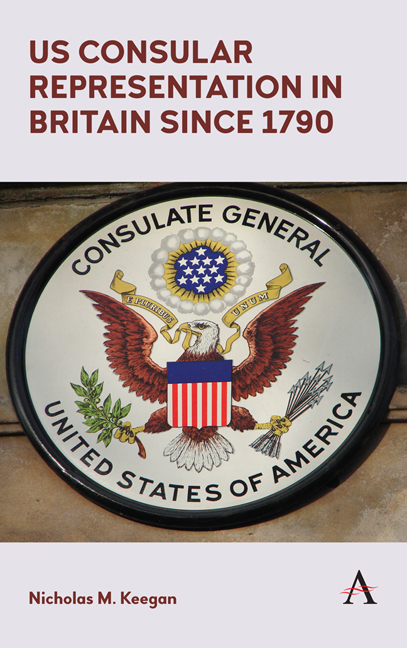Book contents
- Frontmatter
- Dedication
- Contents
- List of Illustrations
- Foreword
- Preface
- Acknowledgements
- Introduction
- PART 1
- PART 2
- PART 3
- Chapter Six Consular Posts and Consular Agencies in Major Cities
- Chapter Seven Belfast
- Chapter Eight Birmingham
- Chapter Nine Bradford
- Chapter Ten Bristol
- Chapter Eleven Cardiff
- Chapter Twelve Dublin
- Chapter Thirteen Dundee
- Chapter Fourteen Dunfermline
- Chapter Fifteen Edinburgh and Leith
- Chapter Sixteen Falmouth
- Chapter Seventeen Liverpool
- Chapter Eighteen London
- Chapter Nineteen Newcastle upon Tyne
- Chapter Twenty Southampton
- Chapter Twenty-One Stoke on Trent
- Chapter Twenty-Two An Evolving, Adaptive Service
- Appendix: Locations and Categories of Consular Offices
- Notes
- Sources
- Bibliography
- Index
Chapter Eleven - Cardiff
from PART 3
Published online by Cambridge University Press: 21 June 2018
- Frontmatter
- Dedication
- Contents
- List of Illustrations
- Foreword
- Preface
- Acknowledgements
- Introduction
- PART 1
- PART 2
- PART 3
- Chapter Six Consular Posts and Consular Agencies in Major Cities
- Chapter Seven Belfast
- Chapter Eight Birmingham
- Chapter Nine Bradford
- Chapter Ten Bristol
- Chapter Eleven Cardiff
- Chapter Twelve Dublin
- Chapter Thirteen Dundee
- Chapter Fourteen Dunfermline
- Chapter Fifteen Edinburgh and Leith
- Chapter Sixteen Falmouth
- Chapter Seventeen Liverpool
- Chapter Eighteen London
- Chapter Nineteen Newcastle upon Tyne
- Chapter Twenty Southampton
- Chapter Twenty-One Stoke on Trent
- Chapter Twenty-Two An Evolving, Adaptive Service
- Appendix: Locations and Categories of Consular Offices
- Notes
- Sources
- Bibliography
- Index
Summary
Cardiff, the capital city of Wales, was once the world's largest coal-exporting port with ships arriving via the Bristol Channel and the Severn Estuary. The first US consular presence in the city opened in 1830 and was an agency, headed by Edward Priest Richards, a local alderman and town clerk. Consular agencies were similar to honorary consulates and were headed by local businessmen and other professionals. Richards was succeeded in 1836 by Richard Jones Todd, a clerk in the customs house, who remained until 1842. During the next twenty years, the agents included Henry H. Parry (a partner in Parry, Brown & Co., who were also vice consuls for Denmark, Germany, the Netherlands and Russia), David Brown and Sidney D. Jenkins (a naturalized American citizen).
The first consulate was established in 1861, with Charles Dexter Cleveland of Pennsylvania in charge. He was 59 years of age and had been a leading classicist, having held the chair of Latin at New York University; he was also an abolitionist and a writer of textbooks and poetry. He remained at Cardiff until 1864 when Charles E. Burch, also of Pennsylvania, was appointed. Burch was allowed to trade in addition to his consular duties. It seems that he may have given more attention to the former than the latter because when the consulate was inspected in 1872, three years after he had left, the inspector was not impressed by his record-keeping. He noted: ‘I should judge from the lack of books and accounts during the time that a Mr Birch [sic] officiated here, that that individual had carried off the books and papers with him. Some reports he had made out had not been sent, and were found among the rubbish which he had left for his successor.’ More in sorrow than in anger, the inspector added: ‘This consulate has been subjected to the vicissitudes of good and bad officers to an extent no less notorious than I discovered at many other places.’ Harry H. Davis, another Pennsylvanian, arrived in 1869. The inspector's report on him was a mixed one: ‘Under the present consul at Cardiff the affairs of the office are well attended to as far as books and accounts are concerned.’ However, he added: ‘I may say that all the business of the consulate is transacted by the deputy and vice consul.
- Type
- Chapter
- Information
- US Consular Representation in Britain since 1790 , pp. 119 - 124Publisher: Anthem PressPrint publication year: 2018



